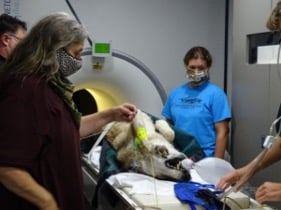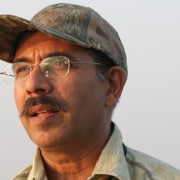The International Wolf Center will be adding pups to its pack in 2021.
Contact information:
Chad Richardson, Communications Director, International Wolf Center
Email: chad@wolf.org
FOR IMMEDIATE RELEASE – The Center planned to add pups in 2020, but the Covid-19 pandemic forced the Center to delay those plans for one year. The pups are expected to arrive in early to mid-May and they will be visible to the public starting on approximately Friday, June 4.
The Center believes in wolf education, and one method for accomplishing the Center’s mission of advancing survival of wolf populations in the wild is through the use of ambassador wolves.
“There are countless benefits when visitors experience the Center’s socialized wolves that offer a glimpse into the individual traits of wolves, showing the social nature of the species that makes it successful as a top-level predator,” said Lori Schmidt, the Center’s wolf curator. “So often people portray wolves for their predatory behavior and don’t appreciate the intricate pack life and social organization that keeps them together as a social unit. As curator, it is my job to maintain a socially cohesive unit of wolves in the exhibit, and we recognize that to do this, new life must be added to the exhibit.”
The pandemic does mean there will be some changes at the Center this summer. The 2021 pups will not be part of the Center’s hourly indoor programs.
“Because of Covid-19 restrictions, we will be offering outdoor viewing opportunities that will require pre-registration to participate in a 15-minute pup viewing opportunity,” said Interpretive Center Director Krista Harrington. “We will do our best to accommodate everyone, but safety of our guests, our staff and the wolves is paramount and opportunities may be weather dependent.”
Another way to see the 2021 wolf pups is with a one-hour behind the scenes tour. These tours are only available for members of the International Wolf Center. Information about membership is available at wolf.org.
Advance tickets are required for everyone
Everyone who visits the Center in 2021 must purchase advance tickets. To get your tickets, click the Book Now button on the lower right-hand side of the page at wolf.org. For members of the Center, entrance tickets are free. Members are also required to book tickets in advance so that we can ensure everyone’s safety.
Your pup viewing opportunity must be booked for the same day as your general admission.
What will their names be?
The International Wolf Center will conduct a pup naming contest beginning in early June and announce the names at a special virtual fundraising event on June 15.
Where are the pups coming from?
The International Wolf Center is a non-breeding exhibit, so when pups are added, we coordinate with another professional animal organization. The source is dependent upon reproductive plans within their facility and availability. We always acquire captive-born pups. This year we are coordinating again with the Wildlife Science Center in Stacy, Minnesota. They collaborated with the International Wolf Center first in 2008 to provide pups Aidan and Denali and had pups ready for us in 2020, but the International Wolf Center had to cancel the transfer due to Covid-19.
In 2021, we are planning to integrate the Northwestern subspecies into our Exhibit Pack.
The Wildlife Science Center has more than 100 wolves and is an active participant in both the Mexican gray wolf and red wolf Species Survival Plan program.
The mission of WSC is to serve as an educational resource for all ages by: providing exposure to wild animals and the body of knowledge generated for their conservation; to advance understanding of wild animal biology through long-term, humane scientific studies on captive populations, thus contributing to technical training for wildlife agencies, educational institutions and conservation agencies.
The International Wolf Center advances the survival of wolf populations by teaching about wolves, their relationship to wildlands and the human role in their future. For more information about the International Wolf Center, visit wolf.org.

 FOR IMMEDIATE RELEASE – Once the doors closed at the Ely Bloomenson Community Hospital MRI unit on Sept. 15, a special patient was wheeled into place for a unique MRI. This patient was a wolf.
FOR IMMEDIATE RELEASE – Once the doors closed at the Ely Bloomenson Community Hospital MRI unit on Sept. 15, a special patient was wheeled into place for a unique MRI. This patient was a wolf.
